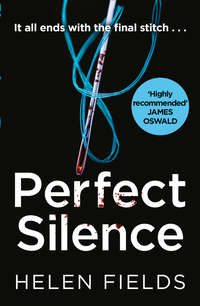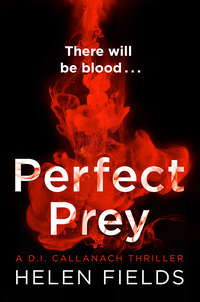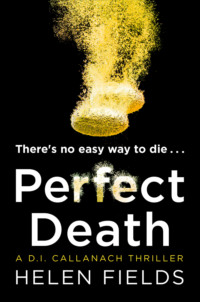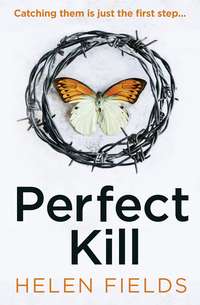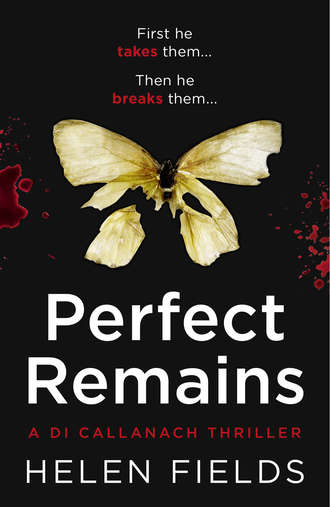
Полная версия
Perfect Remains: A gripping thriller that will leave you breathless
‘I thought I might as well unpack before I’m dismissed,’ he said.
She smiled. ‘I’ve got some single malt in my office. We could toast your welcome and goodbye in one sitting.’ Callanach pinched the bridge of his nose with one hand and breathed in slowly, aware that he was gritting his teeth as he tried to find the least offensive form of words he could. ‘Don’t worry,’ Ava said. ‘You’ve had a long couple of days. Some other time.’
‘I just don’t believe that socialising at work is sensible. Maintaining professional boundaries is important.’
‘Not a problem.’ She smiled. ‘You’ve hit the ground running. Probably best to leave the unpacking ’til morning.’
He ran a hand through his hair and stretched his neck. ‘Look, you’re right, I do need a drink.’
‘No, I think you were right. One in the morning is no time to be here. I’m going home. You should too, judging by the look of you. Goodnight.’ She let his door swing softly shut as he swore under his breath. He could have handled that better. It was time to face his apartment, accept that life had moved on and that he had to move with it.
Chapter Seven
Edinburgh had been the closest Callanach could get to Lyon, in Scotland. It had the feel of a town, in spite of its size and busy economy, and a history its inhabitants celebrated. The city was easy to love with its sympathetic blend of old and new architecture and a population that seemed to have embraced different races and cultures whilst maintaining its own heritage. If they could only control the wind chill factor, he thought, it would be ideal. Callanach had rented a flat in Albany Street. A hundred years ago, it would have been a grand old terraced house, set over four floors, home to one of Edinburgh’s elite families. These days, the inhabitants were busy professionals who would come and go through the central hallway, marking the nearness of their lives with only a raise of eyebrows or curt greeting. He found it wasteful, how little communication passed between neighbours. It was why dead bodies were noticed only by their unbearable odour and how domestic violence could be perpetrated on the same victim repeatedly without intervention. Good neighbours enabled good policing.
He poured a large glass of red wine and picked up a book. Reading himself to sleep had been a habit as far back as he could remember. It was the only thing that distracted him from work. But tonight concentration was difficult. With every page, the image of the bleak Cairngorm Mountains reappeared, forbidding and harsh. Winter was approaching. The Braemar bartender had told them the town would be full of skiers and snowboarders at the first flakes. It was a couple of weeks off yet, but December would bring snow to the peaks. The crowds of summer hikers were long gone, high winds and rain deterring all but the hardiest. The killer’s timing, then, was either planned to perfection or lucky beyond the very best of odds.
Callanach woke early, realising he had no food, craving the tiny cafe on the street corner near his old apartment where he could eat freshly baked croissants and read a newspaper in French. Instead, he hurried to the only place close by and open, a health food store across Broughton Street, where he was surprised by the friendly reception, and picked up dried fruit, yoghurt and rye bread.
He plugged in his computer as he ate, wondering what his private emails would bring. They’d been stacking up for a week and he was tempted to simply delete the lot before reading.
There were administrative emails from Interpol dealing with his departure, requesting a forwarding address for documentation, nothing important. Then there were updates about local events in Lyon he’d usually have attended – a wine festival, sports rally, the opening of a new restaurant – and he pressed delete with a sense of resignation. Much of it was the usual e-junk but then he spotted it, hidden between a wine-club subscription offer and a newsletter from his last gym. A bounce-back notice had come from his mother’s email address. She had apparently moved beyond steadfastly ignoring his communications and taken action by changing her email completely, as she had already done with her mobile phone number. His letters were returned unopened, his landline calls were screened. Callanach threw the remainder of his breakfast in the bin and slammed his laptop closed, immediately regretting how he’d let it affect him. Getting angry wouldn’t change a thing. He was where he was. What mattered now was Elaine Buxton. Nothing else. He had to make the new start work for him. Offending DI Turner the previous evening was a less than impressive start, and an error it would be tactically sensible to rectify sooner rather than later. With the office still to be organised, he changed from his sweats into a shirt and trousers then left for the station.
Tripp was waiting outside his office when he arrived, looking eager and rested. That was the benefit of being in your twenties, immune to too little sleep and careless of stress. For a couple of seconds Callanach was tempted to send him back to Braemar. Uncharitable, he thought. At least DS Lively hadn’t been waiting for him.
‘DS Lively was wanting to talk to you, sir.’ Callanach rolled his eyes. ‘And I thought,’ Tripp continued, ‘given what we learned in Braemar, you might want to visit Elaine Buxton’s flat today, so I’ve organised that for lunchtime, and her ex-husband’s phone number is on your desk.’ Tripp had been busy. Callanach mentally rebuked himself for wanting to send Tripp back to Braemar. The young detective constable was sweetly unselfconscious of appearing too keen. That was a rarely seen attribute in any police officer.
‘Thank you. Where is the detective sergeant?’
‘In the briefing room. Shall I fetch him?’
‘No, we’ll go to him. Coffee en route.’
Approaching the briefing room, Callanach could hear the exact conversation he’d suspected would be taking place. The door had been left open, sensitivity not a concern, and Lively’s voice boomed out.
‘How the hell did he end up walking straight into a detective inspector post? That’s what I’d like to know. It’s not as if there weren’t plenty of other candidates, people who know the city and understand the people. Rumour has it, some bastard pulled more strings than make a fishing net to get him in here. He wasn’t through the door more than ten minutes before dragging us off our patch into someone else’s investigation.’
‘Leave it out, Sergeant, he was just doing what he thought was right for the victim,’ a female voice spoke up. It took Callanach a moment to identify it as DC Salter’s. Tripp tried valiantly to get a few steps ahead and stop the discussion but Callanach put an arm out to prevent him.
‘Let it run, Tripp.’
‘But, sir,’ Tripp started before Lively began again.
‘Go on then, Salter, tell us what you think of him. Some sort of genius, is he, coming out of Interpol and all? Begs the question why he moved here. Maybe the detective inspector couldn’t cut it in the big league and thought this would be a soft option?’
Callanach booted the door fully open and slammed his coffee down on the desk.
‘You asked to speak with me, Detective Sergeant. Is there an update?’ Callanach stared at Lively, ignoring the rest of the crowd.
‘They found blood on the baseball bat and some soft tissue on a tooth nearby. DNA from both is a match for Elaine Buxton. Her case has been officially upgraded from missing person to murder. The pathologist’s report will be through later today. And the Chief wants to talk to you.’
‘Set up a board, Salter. Maps, photos, forensics, everything we have,’ Callanach called as he walked towards the door.
‘It’s still not our case yet, Inspector,’ Lively shouted.
‘It’s about to be my case. If you don’t want it to be yours then there’s a large empty desk in my office where you can leave your letter of resignation,’ Callanach snapped.
Lively stood up. Callanach knew he should leave it there and let tempers cool, but the conversation he’d overheard in the corridor was still worming its way through his veins.
‘You want rid of me, do you, pal? I bet you do, ’cos I heard what you did. Shall I tell you what we do to men like you in Scotland? You fuckin’ froggies might think it’s all right to …’ Lively had stepped forward and punctuated his last few words with a finger poke to Callanach’s shoulder. He didn’t get any further. Callanach shoved him backwards so hard that Lively went flying into the arms of his fellow officers who broke his fall and probably saved him a fractured coccyx. Lively hid his embarrassment with a laugh that made its way through the group as a strained echo.
‘You wanna watch that temper of yours, Detective Inspector,’ Lively said, his mouth a hard smirk across his face. ‘It’ll get you in trouble. Of course, you’re used to that …’
Callanach stepped further towards Lively and his support group, his fists itching to punch the smug grin, biting down so hard he could taste blood in his mouth.
‘Sir, DCI Begbie’ll be waiting.’ Tripp’s voice was soft and unsure but it broke the tension in the room. The fight had already gone out of Lively. He’d made his point and would no doubt continue making it to his audience at the pub after their shift ended. Tripp picked up Callanach’s coffee and files, holding the door open for him.
The length and speed of Callanach’s strides made it necessary for Tripp to all but jog alongside him.
‘DS Lively isn’t good with new people. And he was really friendly with the old DI. I shouldn’t pay too much attention,’ Tripp blustered.
‘If I need your help or your opinion, I’ll ask for it. Now go back to Salter and get those boards up. I want this investigation in order, no more distractions.’
His appointment with Detective Chief Inspector Begbie was predictably draining. The Chief was approaching retirement age and of an old school type. Dealing with his superiors had never been an issue for Callanach at Interpol. They’d trusted his judgment, and seen him rise through the ranks. Here, as he’d just been reminded, he still had to prove himself. It wasn’t that he minded being spoken to like a wayward child, more that he was embarrassed at having to defend his position when it was predominantly gut instinct that Buxton had been killed in Edinburgh. It sounded so trite. Finally the DCI had given in on a limited basis. Callanach was allowed to visit the victim’s flat, talk to witnesses and put together a sufficiently compelling picture to show that he should head the investigation. It wasn’t much, Callanach thought grudgingly, but it was a start.
Elaine Buxton’s apartment was as immaculate as the address was desirable, in the much sought after Albyn Place, overlooking Queen Street Gardens. The decor was tasteful, only the light covering of dust betraying the owner’s disappearance. It was the apartment of a life lived elsewhere, of someone so consummately professional that her standards never slipped. The only room showing signs of life was her study, where two books remained off their shelf on the desk, both doorstop sized and on the subject of contract law. He’d have to review whatever cases she’d been working on when she’d disappeared, but it didn’t seem plausible that so dry an area of law could give birth to such a violent crime.
He sat in her large leather chair and leaned back. It wasn’t comfortable. The headrest wasn’t worn. This wasn’t a woman who used her study to contemplate life. As Callanach sat forward to open the drawers, the cushion shifted slightly beneath him. Yes, that was it. Her constant position, head bent towards book or brief. Always working, concentrating. The interiors of the drawers were as orderly as the surface. A Montblanc fountain pen was in its case, highlighters remained in their plastic container and painkillers, open and half used, were tucked back into their packet. A black glass paperweight, smooth and tactile, held down a neat pile of bills and correspondence. Callanach reached out to touch it, imagining Elaine doing the same as she read or made telephone calls, feeling the cold stillness beneath his palm. It was plain and simple, and it did its job perfectly. Much like the woman herself. Elaine Buxton liked order and routine. What was missing, Callanach thought, was a sense of self. There was not one photo on display. Likewise any plants. No living thing that might require care or attention. Healthy homemade meals were labelled and stacked in the freezer, each in a handy single-person-sized portion. The whole place seemed devoid of human touch.
Callanach retraced his steps and went back into her bedroom. The bed was bare, the sheets stripped by the forensics team looking for signs of sexual activity and DNA. None but hers had been found. There was minimal makeup in her drawers, only two bottles of perfume in her en-suite cupboard. He opened her wardrobe and found two rows of shoes, split between work and exercise. It was ironic how someone who valued order and neatness so highly could have ended their life in such chaos and trauma. At what point had she realised something was wrong? As soon as she’d left the gym, perhaps. Had someone been following her or was he waiting for her at home? Buxton was fit and healthy. She’d have put up a fight if she hadn’t been taken completely by surprise. There was no sign of a struggle, though.
Finally, among neatly folded sweaters, Callanach saw the one thing that had been missing. A ragged teddy bear peeked down from the top shelf, much loved, by the look of it, too precious to put away with the other childish things. Something to look at every morning and evening as she dressed and undressed. A fragment of warmth in an otherwise formal home. He closed the cupboard door against the bear’s forlorn, waiting stare. It wouldn’t help him find her killer and it didn’t progress matters to dwell upon the human loss. Only science, logic and research solved cases. Elaine’s house offered nothing further. Callanach locked up and was glad to leave the silence and stillness behind.
Calls to her ex-husband Ryan proved unrewarding. He’d been out of contact with her for more than a year. Following the autopsy report, police officers notified Elaine’s mother of her death that afternoon. Callanach was pleased it wasn’t his job on that occasion. No amount of training or experience made delivering death notifications any easier. The press was given the information shortly afterwards, with a renewed request for information. Callanach chased up the friend whose birthday celebration Elaine had attended at the gym and found she’d been more of an acquaintance in reality. They’d shared a Pilates class, worked out together each Wednesday and Friday but didn’t socialise anywhere else. Elaine hadn’t mentioned a boyfriend, she’d told Callanach, not that they chatted about that sort of thing. It was in keeping with the way she lived. Work colleagues all said the same. So, surely, Callanach mused, she’d have noticed someone taking an interest in her, watching her, following her. She was a lawyer. She’d have known there were court orders available to protect her. Was her murderer so restrained that he’d never once revealed himself?
Elaine’s diary and correspondence had been seized as evidence. Callanach took the paperwork home, expecting little more than meetings and reminders in to-do-list form. It had already been inspected by the missing persons team and no useful information had been identified. The diary was A4-sized, with a sheet for each day, the notations proficiently brief.
Three weeks prior to her abduction was this: Senior partner review. Resolution statistics good. Increase in billable hours required. Buxton was an achiever but not someone with a hard head for business then, failing to squeeze her clients hard enough for money. The oddity of a likeable lawyer. Callanach flicked through the remaining pages, finding only a well-organised professional who structured her day carefully and filled her time to the maximum.
The pages of the diary gave nothing away that Callanach didn’t already know but tucked inside the back cover was a card from what was presumably an old friend, announcing the birth of a baby girl and updating Elaine as to recent news. A house move, a career break while she enjoyed some parenting time, a joke about a mutual acquaintance. Nothing that indicated the friend had seen Elaine for months, if not years. The return address was London. Behind the card was a half-drafted letter in reply. It began with the expected congratulations, comments about the baby photos and questions about the house move. Then the tone changed.
I’m so sorry I missed the baby shower and it doesn’t look as if I’ll make it to the christening either. Work is a bit pressing at the moment. You always did tell me I take life too seriously – I’m starting to think you were right! I’ll do my best to get down to London for a visit soon. Perhaps I’ll amaze you and book a holiday like you suggested. I haven’t been away since the divorce. Maybe I’ll even meet someone new (you’re bound to like him more than you did Ryan). Time to get my head out of the books.
Callanach closed his eyes. There was no good murder, no fair or reasonable circumstances under which a life could be stolen, but Elaine Buxton had been cruelly robbed. How had she felt when the thought crystallised in her mind that she was being abducted? Did the irony of that unfinished letter occur to her, with its dreams of holidays and meeting a new man, or was the panic too all encompassing? Had she finally found her voice and fought for her life? Callanach put the papers down. One hand wandered into a pocket as he paced his small sitting room, and there, as if it was a stowaway, he found Elaine Buxton’s paperweight. He took it out, brushed a stray strand of cotton from its unblemished surface, tried to recall the precise moment he’d taken it and how he’d justified it to himself at the time, but the memory was a cloud. Slowly, quietly, almost as if he were being watched, he slid the heavy glass under his pillow.
Chapter Eight
King seethed at Elaine’s lack of cooperation. It was usually beneath him to be reduced to obscenities but, if he were forced to use a common phrase, he might say she was being a fucking bitch. He’d tried to fit her new dentures but she’d cried when he’d pushed them into her mouth, moaning at the pain from her gums, saying they were still too sore. The disgusting creature had shaken her head to and fro like a rabid dog, trying to avoid the procedure. He’d known he would have to tolerate her saliva and had gloved-up in readiness. Her head throwing, though, had sent streams of mucus from her snivelling nose across his face. He could have vomited with repulsion.
She had to respect her new situation. If she wouldn’t learn willingly then she would be taught. Discipline would do her no harm. The protein shakes he made her weren’t appreciated either. Half a dozen times he’d had to hold her nose and tip it into her mouth. She’d soon stopped thinking she could starve herself. King took an old, wooden ruler from a drawer in his study, picked up his laptop as an afterthought and retraced his steps down the official and up the unofficial staircases. A tiny nick at the edge of the panel hiding the keyhole would have to be polished out. It wouldn’t do to get sloppy. Not when everything else had gone according to plan.
Elaine frowned when he entered. Like a stroppy teenager, he thought. But it wouldn’t last long. If he could just help her progress through this stage, she would see sense. He walked to her bedside without speaking. There was no point engaging with her. It would only create another scene. This help he was giving her, this tough love, was best dealt swiftly and silently. King checked that the chains and cuffs binding her hands were tight enough that she couldn’t thrash and cause too much additional damage. She closed her eyes tightly and her mouth even more so, assuming, no doubt, that he meant to try again with the dentures. Her behaviour proved she needed more than just coaxing to comply. This was, he decided, an inevitability of neither his choosing nor his making. It was all her fault.
It wasn’t until he pulled her ankle chains tighter causing her legs to part wider, that she began screeching. However, he was delighted to note that no amount of hysteria made a millimetre of difference to her bindings. He was clever to have thought so carefully about the restraints he would need for his guest suite. King giggled shrilly. Elaine stopped shrieking and stared at him as if he’d grown a second head.
‘Guest suite,’ he muttered aloud.
In a second, she was bawling like a toddler again. Don’t talk to her, he counselled himself. Silence until the lesson has been given. That was when she began to beg. He’d known she would.
‘Pleath, pleath don’ rape me. Pu’ in the denture. I’ll be good.’ King rotated his head slowly from shoulder to shoulder, working out the tension her pathetic whining had caused. He looked coolly into her eyes. He could reassure her, he supposed. After all, he had no intention of raping her. He wasn’t an animal. Only foul lowlifes who couldn’t get it anywhere else were reduced to rape. Then again, if the prospect scared her sufficiently to induce compliance, why shouldn’t he use the threat as part of his portfolio to help subdue her?
‘Not subdue,’ he whispered. ‘Educate. Damn!’ he shouted. Why was he talking to himself? She’d thrown him off balance with the rape comment. He had to concentrate. King picked up the ruler and hit the bare sole of her left foot, hard. The smacking sound it made was like clean, white light. In his head he counted and made it to four before the screaming began, the myriad of nerve endings taking their time to communicate with her brain. Now he would allow himself to speak.
‘That took longer than I’d anticipated,’ King said. ‘This is what the Germans call Sohlenstreich, quite literally a striking of the soles. An ancient and well-practised form of correction used in cultures across the world. My father taught me about it at quite a young age. He was a gifted educator.’ He snapped the ruler across her other foot. This time Elaine knew what was coming and emitted the scream, if anything, slightly before wood contacted skin. ‘Effective because it’s extremely painful, but leaves few marks or lasting injury. I shall be careful not to break any of the bones in your foot, although sometimes there are accidents.’ He slapped her left foot with the ruler again.
‘As for raping you, get your mind out of the gutter. I am not so needy as to require such base rewards.’ The level of her screaming was becoming intolerable.
‘If you do not stifle that noise,’ he said, punctuating each word with a strike on one foot then the other, ‘I shall not stop!’ Eleven blows in quick succession. More than he’d intended to deal her. She was starting to pull herself together though, eyes wide, watching him, weeping rather than yelling. Her whole body was shaking. It was shock, but she’d come round. The human body was more resilient than the mind.
‘I’m going to ask you some questions to check that you are progressing. If you answer correctly this will end and we can be friends again. Will you let me fit the dentures without fighting me?’ Elaine nodded furiously. ‘Good. And will you drink your protein shakes without fuss?’ More nodding. ‘What was the German word for this form of correction?’ Silence. He raised the ruler into the air.
‘No, no, I’m trying to remember, I’m trying,’ she whispered, her throat coarse. Even without the dentures she was working harder to speak clearly, playing the diligent pupil.
‘You weren’t paying attention, were you, Elaine?’ He slapped the ruler against her right sole, quite lightly he thought, but still she let loose another assault upon his ears. He supposed the pain was increasing with the bruising.
‘Come along, think about it …’
‘I don’t know, I can’t think. Don’t hurt me any more,’ she sobbed.
‘Sohlenstreich,’ he shouted, hitting her left foot hard. ‘Sohlenstreich, say it with me.’ There were more blows, he’d lost count by then but the miracle had happened. She was chanting the word with him, over and over, with each blow to her feet. There was no more crying. Elaine had learned. He felt a burst of joy, close to exultation. The knowledge that he had triumphed, that he’d been right about this all along, was as powerful as he could ever have imagined. He felt a thrumming inside. The first step was complete. He had changed her, brought her closer to perfection, brought her closer to him.


